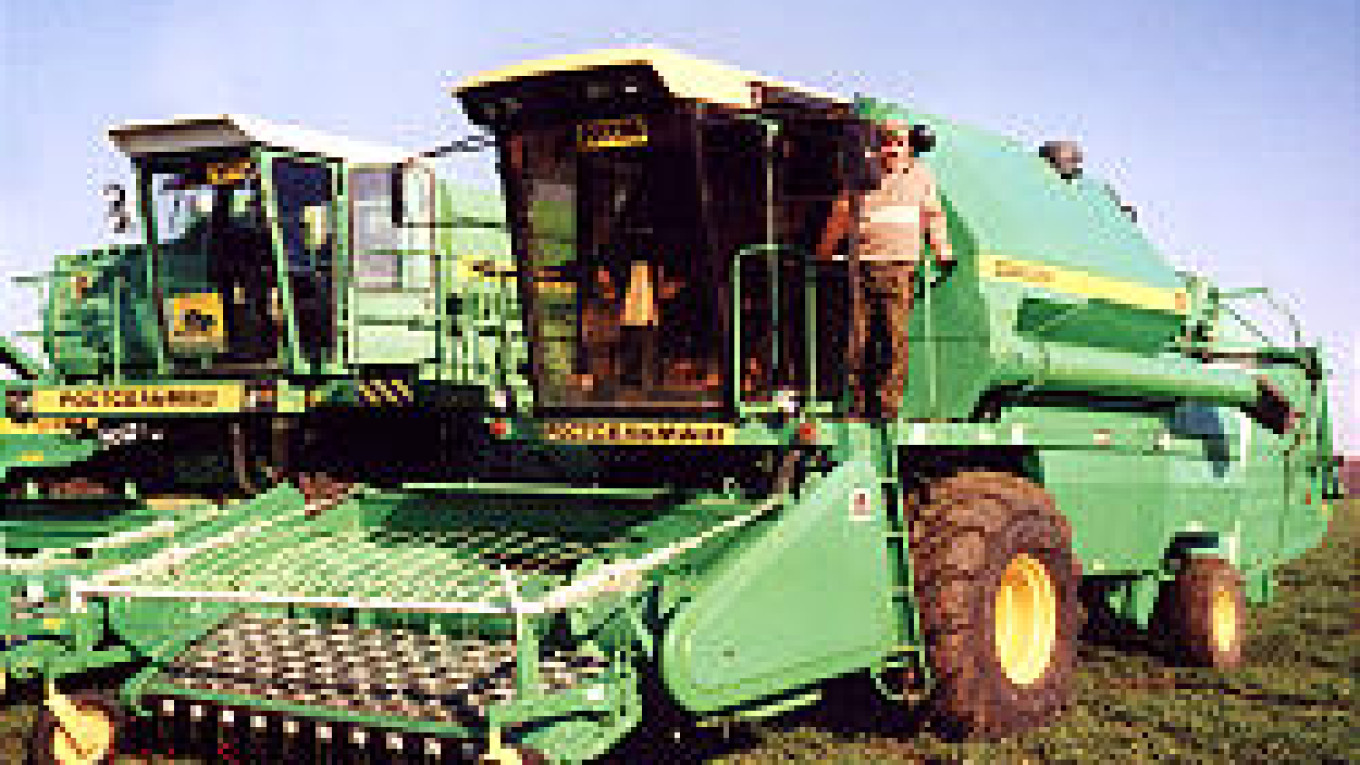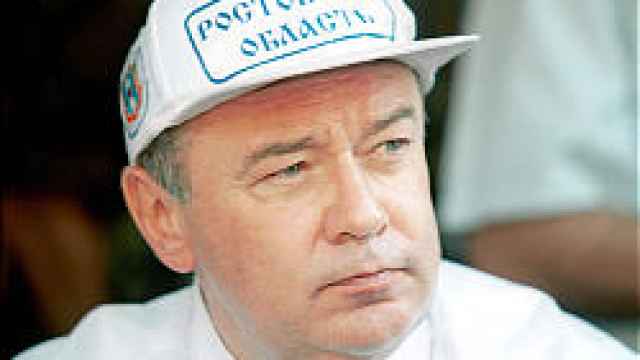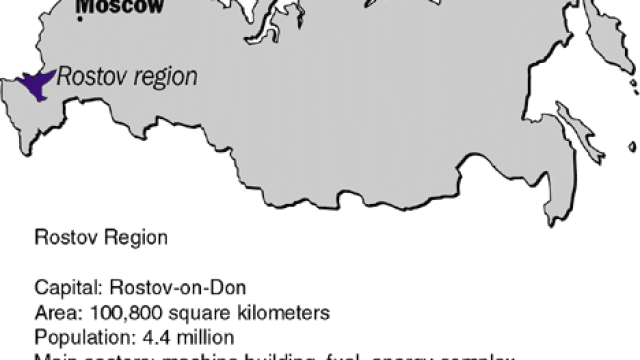Kislov's plant, which started up production last year, now claims to be the largest such plant in Europe, producing 14 percent of Russia's sunflower oil and exporting to Germany. It takes in 1,100 tons of sunflower seeds a day and pumps out 600 one-liter plastic bottles of Zolotaya Semechka oil, while also feeding the pudgy pigeons that flock around it.
The plant is part of Yug Rusi, a vertically integrated agricultural holding company headed by Kislov that produces not only sunflower seeds and sunflower oil but mayonnaise and mixed fodder. In 2001, Yug Rusi invested more than 800 million rubles ($26.6 million) in 14 farms in the Rostov and neighboring Krasnodar regions, providing fertilizers, fuel, machinery, consultancy services and loans.
Among its 28 entities, the holding has three elevators, a river terminal next to the sunflower-oil plant, a bread-making factory, a distribution network, a mill and even a race track. Yug Rusi plans to build its own dairy processing plant and recently bought a bankrupted poultry farm.
"Our profits for 2000 were 192 million rubles and turnover about 2 billion rubles," said Yug Rusi spokesman Sergei Ivanenko. "On July 1 of this year, profits were already 341.5 million and turnover -- 3.7 billion rubles."
In the first issue of a newspaper that his holding started in October, Kislov said: "I am sure that as time passes our holding will become not only the biggest processor but also the major agricultural producer in the Southern Federal District."
Kislov is among the entrepreneurs who made his pitch to hundreds of potential Russian and foreign investors at the South of Russia investment symposium that opened Wednesday and runs through Saturday at the World Trade Center in Moscow.
He is seeking $11.5 million to establish a new line for processing more highly refined sunflower oil, which can be used to make solid oils, soups and as an ingredient in perfume.
The Rostov region -- larger than Belgium, the Netherlands and Denmark combined -- has had limited success so far in attracting investment, especially from foreign companies. In 2000, foreign investment was $91.1 million, of which $40.8 million was direct investment, according to government statistics. By comparison, Krasnodar received $959 million in foreign investment last year and Volgograd $77 million.
Russian investment is considerably higher and is growing. In the first nine months of this year, $615 million was poured into the local economy, compared with $635 million for all of 2000.
The largest share of foreign currency invested in Rostov last year, 59 percent, went to the food industry, the regional administration said. Trading companies got 22 percent, telecommunications 7 percent and transportation less than 4 percent.
|
Itar Tass Rostov region Governor Vladimir Chub |
Foreign companies that are investing in Rostov have good things to say.
"We found out that there are a lot of highly qualified professionals in Rostov, and overall the climate in the region is positive for investors," Yury Dombrovsky, CEO of the Luxemburg-based Millicom International Cellular S.A., said in a telephone interview from his Moscow office.
Millicom, a telecommunications company that develops business in emerging markets, has invested about $10 million in Rostov Sotovaya Svyaz since 1995.
What Rostov wants most, though, is money to modernize its hundreds of industrial enterprises -- Soviet-era monsters that do everything from smelt metal to build aircraft. Rostov makes the only long-distance electric locomotives and large boilers in the country. It produces more than 94 percent of the industrial sewing machines and half of the country's grain combines.
The requests submitted to the Moscow investment symposium range from the $8,300 that a tiny company in the village of Zavetnoye wants in order to restore the offices where it collects vegetables and berries from peasants, to the $437 million that Taganrogskaya Aviatsiya is asking for to establish mass production of a Tu-334 passenger plane.
Some of the projects are high-tech, such as the creation of a helicopter for extinguishing fires (Rosvertol is seeking $5 million in investment) and the completion of feasibility studies for the new Be-32K small plane and putting it into mass production (the Beriyev Factory in Taganrog needs $83 million).
Other projects are less sophisticated: The Rubin's state factory in Rostov is bidding for $220,000 to start production of enamel dishes, while the Rostov Prison Department is asking for $65,000 to produce barbed wire.
But most of the projects are linked to the modernization of equipment or the establishment of new production lines.
Rostselmash -- the largest builder of agricultural machinery in Russia, which, according to Troika Dialog, holds 57 percent of the market -- is seeking $30 million to establish mass production of the new Don-091 combine to replace its old Niva version. The plant, which is prepared to invest $30 million of its own money into the $60 million project, plans to make the first 100 combines in 2003 and start mass production in 2004. The new combine will collect 9.5 tons of grains an hour, while the Niva collected 7.2 tons, but it is expected to cost $36,000, compared with $25,000 for the Niva.
"We have big demand for the Niva, but it is outdated," said Vitaly Vasilenko, chief constructor at Rostselmash. "This one is more comfortable for the driver and it has very useful electronic indicators of the working systems so that the combine driver can see where things go wrong, if they do. I am sure farms will prefer to buy this combine even though it is more expensive than the Niva. Anyway, it is several times cheaper than foreign machines and is better adapted to our soil and climate."
Whether or not Rostselmash is able to get investors interested in its project could say much about the future of other Soviet-era enterprises in the region. If this industrial giant, which is 20 percent owned and supported by the regional administration and now managed by a progressive team of investors, is unable to attract investors, then other projects have little hope.
Rostselmash also is in place to benefit from an expected increase in demand for combines if the Kremlin succeeds in pushing through legislation allowing the sale of agricultural land.
But, as it is, the plant is only barely alive. Before perestroika it made 370 combines a day, or about 80,000 a year, employed 50,000 people working in three shifts and formed 40 percent of the Rostov city budget. Last year, it made only 2,600 combines and expects to produce about 6,000 in 2001.
The plant now works in only one shift. The workers who remain complain about their wages of about 3,000 rubles a month and the lack of young workers to replace them. Most appear to be at least 50 years old and much of the work they do seems primitive, with hammers a common tool.
A new team of Moscow investors, called Novoye Sodruzhestvo, purchased about 40 percent in the plant in 2000 and is trying to acquire enough shares to give it a majority stake and thus better control over the plant. About 30 percent of the shares is held by the workers and other individuals and 10 percent is controlled by portfolio investors.
The task became more difficult when the government agreed in mid-November to restructure the plant's federal tax debt of 725.4 million rubles for the next eight years. The share price doubled almost immediately from about $10 to about $20, and the local media has speculated that if a decision is made to restructure its 2.2 billion ruble tax debt to local budgets, the price per share could go up to $50.
In ratings published by Expert magazine in October 2000, Rostov was 15th among the 89 regions in terms of the favorability of its foreign-investment climate.
In a more recent report on foreign investment, issued in September by Troika Dialog, Rostov was not among the top 10 regions listed, but Troika senior analyst Tom Adshead said it was not far behind.
"Like Krasnodar, it does well because it is close to important transport corridors, although it lacks the oil and gas aspect of the local economy," Adshead said.
"The investment climate in any one region depends on the attitude of the local government to foreign investment. This is more important than location, climate or the size of the local market. One of the points of our report was that the best regions attract most of the foreign investment because the bad regions are so hostile to foreign investment, creating too much bureaucracy, and too unstable of a tax regime."
The Rostov region has created favorable conditions for large investors. Under a regional law, tax breaks are available to companies that invest more than 5 million rubles in Rostov, Taganrog, Azov and Novocherkassk, 500,000 rubles in six areas prone to drought, or 1 million rubles in all other districts.
Approved in 2000, the law replaced a 1996 law that allowed tax breaks only for investments of $10 million.
But fewer than 10 enterprises in Rostov were able to take advantage of the tax breaks this year, said Anatoly Bryukhovetsky, the Rostov deputy governor who heads the regional economics committee, in an interview last summer with the local Delovoi Rostov newspaper.
The region also offers low-interest budget loans and state guarantees for bank loans to selected projects.
But Yury Yevchenko, executive director of Club Yug Rossii-2015, which unites most of the more progressive local businessmen, said the administration needs to do more to improve the investment climate.
"The system of state support boils down to success in individual negotiations between the potential investor and the administration, and big investors are the most welcome," Yevchenko said in a telephone interview.
One of the region's major foreign investors, Famadar Cartona Ltd., praised the Rostov administration for its assistance. Natalina Yatsenko, the company's deputy director, just laughed when she was asked about corruption in the local administration, an insurmountable obstacle for many foreign investors in Russia.
"Once I brought a box of chocolates to our regional administration's economic department. I tell you, I thought they were going to bang me over the head with it," Yatsenko said in a telephone interview. "I am 44, I have worked in various enterprises and in various Russian regions, but such a thing happened to me for the first time."
Her company was founded -- with 100 percent Cypriot and Greek investment -- in 1999 in Taganrog to produce corrugated cardboard and packing after it purchased 75 percent of the facilities at the local Pressmash works, which used to make machine tools.
"Of course everything can't be perfectly smooth in Russia. But there isn't any pressure from the regional or local administration, from any fiscal authorities, or even a negative attitude. We get tax breaks. They leave us alone -- and we are happy about it.
"I think it is because they understand that investors are needed," Yatsenko said.
Dombrovsky of Millicom said the company had some problems in the beginning but they were all sorted out with the help of the Rostov administration and Governor Vladimir Chub.
"When we were obtaining the license back in 1995, the local telephone company refused to provide us with the connection and we had to apply to the anti-monopoly committee," Dombrovsky said. "Here a critical, positive role was played by the governor, who decisively took the side of the investor."
Dombrovsky said Chub called a meeting of his officials and said he wanted competition to be established. After this, the license was immediately produced.
"We also used to have problems with the local mafia -- our people were threatened and attacked -- but now it is all sorted out, and also with the help of the administration," Dombrovsky said.
According to Prime-Tass, the region, where 80,000 companies are registered, has 736 ventures with a foreign stake. Out of a combined charter capital of 2.9 billion rubles in these enterprises, 69 percent was invested by foreign countries, including the United States, Britain, Italy, Germany, Turkey, Bulgaria and Poland.
However, only 300 ventures with foreign capital are "operational," said Bryukhovetsky, the deputy governor.
Ivan Rodionov, executive director of AIG Brunswick Millennium Fund, said there are several factors that make the Rostov region not so attractive for investment.
"First, it is too close to the North Caucasus," Rodionov said in an interview. The lack of transparent accounting also makes regional industries and agriculture unattractive for the foreign investor, he said.
Rodionov said it would take a few years until local investors -- who have already started to put their money into such enterprises -- have consolidated assets at these plants and put things "in order." Then, he said, "we will be able to introduce such an enterprise to the world market.
"Now I simply can't see how an investor could sell the enterprise he invested in here," Rodionov said.
Andrei Balkin, credit expert with the Rostov branch of DeltaLeasing, agreed that direct investments in the real sector are highly risky due to weak federal legislation and law enforcement.
"I think the best option for investors at this point is indirect investment through Russia-based financial structures working in a stable manner that have a good reputation, including via leasing companies. It is desirable that a controlling or blocking stake in such companies belongs to a strategic investor."
DeltaLeasing is a subsidiary of New York-based Delta Capital, a private equity manager. It was established to manage the U.S. Russia Investment Fund, which was created by the U.S. Congress and has invested close to $200 million in Russian companies, according to Delta Capital's web site. Up to $3 million of that sum was invested in the Rostov region, Balkin said.
Yatsenko of Famadar Kartona said investors could find good opportunities in the Taganrog and Rostov regions. "But before they come here, they must find out all about our investment and taxation laws and of course talk to local businesses about their experiences here as well as with the administrations."
Dombrovsky agreed. "Our experience shows that if investors are interested in the region, they should first talk to the local business societies about possible support, partnership and development of the business."
Many enterprises from Rostov filed their business plans for the investment symposium. They can be found atwww.iis2001.ru
|
A Message from The Moscow Times:
Dear readers,
We are facing unprecedented challenges. Russia's Prosecutor General's Office has designated The Moscow Times as an "undesirable" organization, criminalizing our work and putting our staff at risk of prosecution. This follows our earlier unjust labeling as a "foreign agent."
These actions are direct attempts to silence independent journalism in Russia. The authorities claim our work "discredits the decisions of the Russian leadership." We see things differently: we strive to provide accurate, unbiased reporting on Russia.
We, the journalists of The Moscow Times, refuse to be silenced. But to continue our work, we need your help.
Your support, no matter how small, makes a world of difference. If you can, please support us monthly starting from just $2. It's quick to set up, and every contribution makes a significant impact.
By supporting The Moscow Times, you're defending open, independent journalism in the face of repression. Thank you for standing with us.
Remind me later.




